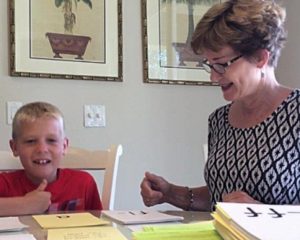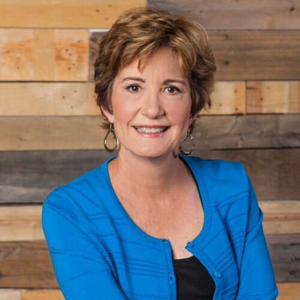As a speech language pathologist in Orlando, Evans was selected to be part of the district’s Response to Intervention team, which included working with teachers at 26 schools to evaluate student abilities, as well as provide guidance to educators.
What she heard from teachers across the board was the same “cookie cutter” response, she said: teachers of second and third-graders saw low comprehension rates. Though they would continue to test comprehension, Evans said what many were forgetting to do was take a step back to see if critical foundational phonic skills were there first. Typically, they weren’t.
Wanting to learn all she could on how to best assist students and educators with ways to improve overall literacy, in particular speech and comprehension, Evans said she decided to learn Orton-Gillingham by training with the Institute for Multi-Sensory Education. She was so impressed with the experience she decided to incorporate it into her after-school private tutoring lessons.
“It’s been as rewarding for me as it has been for my students because I see it’s that missing piece,” Evans said.
During her IMSE Orton-Gillingham practicum training, Evans said she used the methodology with one of her tutoring students, a boy named John, who she had already been working with for a year to help boost his weak phonics skills and improve his reading comprehension. Within her lessons, Evans used creative approaches that also engaged him, such as integrating “slime” and other “hands-on” projects that included physical and visual components.
In just a year’s time, John had made over a year’s worth of growth, she said. In the span of a year, his D’s and F’s had transformed into A’s and B’s. She credited IMSE’s Orton-Gillingham’s individualized and multi-sensory approach with being able to strengthen John’s underlying ability to read, while also improving his phonics.

Susan Evans and using IMSE’s Orton-Gillingham with her students during an after-school session.
“His comprehension just blossomed,” she said.
“He could [already] read,” she added, explaining the problem is that the format many schools use doesn’t always lend itself to individualized instruction based on student needs. “His confidence just hit the roof.”
“Those skills are now engrained; he’s a confident learner and doing quite well — it just makes me so happy,” Evans said.
“All The Puzzle Pieces Fit Now”
While John has improved to the point he no longer needs Evans’ help, the private tutor continues to use IMSE’s Orton-Gillingham with three of her students today, in first, fourth and fifth grade.
And, like with John, she’s seeing significant gains: her first-grader alone has moved from receiving high D’s to earning B’s.
Like the training was the “missing piece” with her after-school students, Evans said she believed IMSE’s Orton-Gillingham would also benefit students within the public schools system in general, including where she teaches in Orange County.
“I think [IMSE’s] OG is the missing piece in public education,” Evans said.
In Orlando, students do have access to a computer-based literacy program, which is helpful, but it lacks the personalized touch of IMSE’s Orton-Gillingham, she said. Plus, she added, not all students have computers readily available to them or have the same skills when it comes to using technology, making IMSE’s Orton-Gillingham approach a more accessible option.
“Not everybody can use a mouse, so it’s not fair, in my opinion, to place a child in a certain level because they don’t have a computer at home,” she said.
It’s a problem the University of Central Florida graduate said she now sees a solution for in IMSE’s Orton-Gillingham. Having been trained in IMSE’s methodology for over two years, Evans said she has transformed and grown as an educator herself, being able to pick up on insights that help her better understand the students she works with.
“It’s really made me so much better of a speech language pathologist because all the puzzle pieces fit now,” she said.
“I understand when I go to an IEP meeting where the child is with their oral reading fluency; I understand about the phonics continuum and where they should be and where they’re at… it makes me so much stronger of a clinician because I understand all the components of how a child comprehends and learns to read.”

Susan Evans has been an educator in the Orlando area for 35 years and said IMSE’s Orton-Gillingham is the “missing piece” for students struggling with reading.
Evans said she would encourage a range of different educators to participate in the training, beyond just those who are interested in learning reading. Interventionists, speech language pathologists, special education teachers and assistants and more could all benefit, she said.
“[IMSE’s] OG is an extremely effective program,” Evans said. “It is the first step in phonics, but also for those students struggling with reading comprehension. You have to go back and solidify those phonics skills.”
From her experience using the program in her private practice, Evans said IMSE’s Orton-Gillingham has also served as a light at the end of the tunnel for some of her students’ parents, who at times can also feel “defeated.”
“Sometimes parents get so discouraged,” she said. “I think it’s important for parents to realize: This is a program that can help their student.”
For Amy and Will Mims, the parents of Evans’ former student John, the proof was in the pudding. Evans had “boosted” their son’s confidence and reading comprehension, while serving as a “reliable, patient, creative, kind, professional” educator.
“[Our] son has struggled with reading for several years but Susan made it fun for him in her sessions while also making great strides in his academic progress,” the Mims wrote in a testimonial for Evans. “She also was very helpful in working with our son’s teacher on classroom material each week… my son’s teacher has complimented his reading progress by giving credit to his tutoring sessions with Susan Evans.”
Learn about the Institute for Multi-Sensory Education’s Orton-Gillingham’s certification programs and how educators using IMSE’s Orton-Gillingham are transforming the lives of students across the country.
